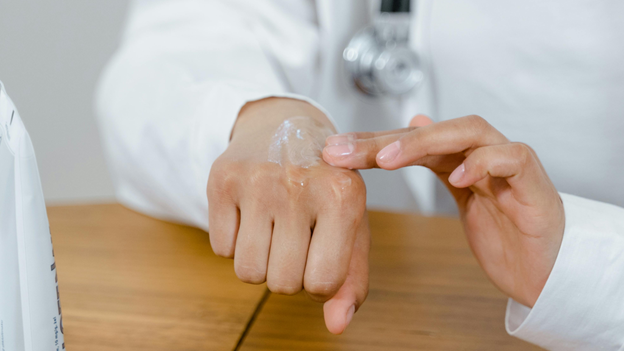In simple terms, eczema is a skin problem that makes your skin dry, itchy, and red. It affects many people. About 15% to 20% of children and 1% to 3% of adults worldwide struggle with it. This shows how common eczema is and why it’s important to know more about it.

What is Eczema and Its Varieties?
Eczema is not just one skin condition but a group of them. The most common type is atopic dermatitis. Other types include contact dermatitis, which happens when the skin reacts to something it touches. There are others too. Knowing these types helps us understand that eczema can appear differently for each person.
Unraveling the Causes and Triggers of Eczema
The causes of eczema can be many. Genetics play a big role. If your family members have eczema, you might get it too. Besides genetics, things around you can trigger eczema. Dust, pollen, and even stress can make it worse. Changes in weather, like winter’s dry air or summertime heat, can also be culprits. Eczema also links to the immune system. People with it have sensitive immune systems that overreact to small irritants. Another big reason is the skin barrier. When the skin doesn’t work well as a barrier, it lets irritants get in and cause problems. So, understanding eczema means looking at many potential causes and triggers.
Recognizing Eczema’s Symptoms and Diagnosis Procedures
Eczema shows up as itchy skin, dry patches, and redness. But the way these look can be different for each skin color. For lighter skin tones, the redness is more obvious. For darker skin, eczema can look more purplish or gray. When it comes to diagnosing eczema, doctors usually look at the skin and ask about symptoms. They may also ask questions about family history and any allergens you might have come across. It’s about piecing these clues together to get the correct understanding of your eczema.
Exploring Lifestyle Changes and Skincare Routines to Manage Eczema
Managing eczema often involves changes in daily habits. A simple skincare routine helps a lot. Here are a few steps:
1. Moisturize daily to keep skin soft.
2. Use gentle soaps to avoid irritation.
3. Take warm baths, not hot.
It’s also key to avoid triggers like certain fabrics or foods that might make your eczema worse. Diet also matters. Eating more omega-3 rich foods like fish can help.
Modern and Traditional Treatments for Effective Eczema Management
There are various treatments available for eczema. Traditional ones include emollients and moisturizers. Corticosteroids are creams that help reduce itching and swelling. Modern treatments offer new hope. Biologics are medications that target the immune system’s role in eczema more precisely. There are also JAK inhibitors, which help the skin heal faster. Traditional medicine, often found in India, uses herbal remedies and oils to provide relief. It’s about finding what works best for the individual.
Addressing the Emotional Impact of Eczema and Support Systems
Living with eczema can be tough mentally. Many feel self-conscious because of its appearance. This can make them anxious or sad. Mental health support for eczema sufferers is crucial. Support groups and therapy can offer help. Special care is needed for children with eczema. They need understanding and encouragement to deal with their condition confidently.
Eczema may be complex, but understanding its causes, symptoms, and treatment options can make a world of difference. With the right steps and reliable support, managing everyday flare-ups becomes simpler, allowing you to enjoy healthier, happier skin.
At Skin Rituals Aesthetic Clinic, we provide personalized care and advanced solutions to help you stay in control. Contact us today and experience relief that lasts!


